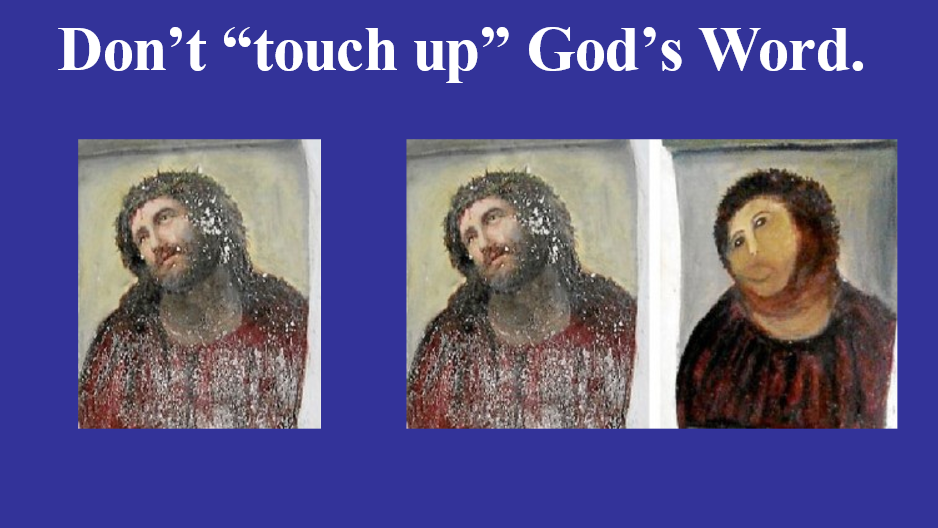The Book of James – Can faith without works save you?
length: 86:05 - taught on Feb, 26 2023
Class Outline:
Sunday February 26, 2023
"The Mirror of Erised is an ancient, ornate mirror in JK Rowling’s Harry Potter series. According to Albus Dumbledore, it showed the "deepest, most desperate desire of our hearts." The name "Erised" was "desire" spelled backwards, as if reflected in a mirror. The happiest and most satisfied person in the world would look in the mirror and see a reflection of them, exactly as they were, for they would then have no one and nothing more to yearn or desire for that the mirror could ever show them. But of course, it was intrinsically inherent for human nature to desire something greater than one's own self. Men could waste away staring at it, seeing their desire fulfilled in the mirror, a vision that had been known to drive men mad; a vision that was not true.

The writing engraved on the frame of the mirror was supposedly in a foreign and probably dead language, but if one looked closely it said "I show not your face but your heart's desire" backwards, with the spaces rearranged. Erised stra ehru oyt ube cafru oyt on wohsi.
If someone today looked into a real mirror and couldn’t look away, they’re seeing what they want to see and they love it, and we have a name for that.

The wonderful myth of Narcissus - known for his beauty, fell in love with his own reflection in a pool of water, staring at it for the rest of his life. When he died at the edge of the pool, a flower grew at the spot.
………
There is little that we would call theology in this letter. Christ is only mentioned twice; the opening line where James identifies as a bond-slave of Christ and in 2:1 as the Lord of Glory.
If there is no theology in the letter, you can see the trouble that can arise when people try to develop theologies from the Book of James. If you know anything about the book, you know the famous line, “faith without works is dead.” This is true in the context of the book, but should I take this line and create a soteriology out of it (theology of salvation)?
If the book doesn’t contain theology, what does it contain?
Theme of James: The proper response of faith when it is tested.


James deals with the behavior of Christians in trials, and he brings out the key areas in a believer’s life where this behavior must manifest itself in a particular way.
Manifestation or the response of faith is the key to James’ letter. If you say you have faith and you don’t live out what that faith claims to believe then you will not be saved.
One of the several great images that James uses is a mirror. Paul uses the same image.
Now the Lord is the Spirit, and where the Spirit of the Lord is, there is liberty. 18 But we all, with unveiled face, beholding as in a mirror the glory of the Lord, are being transformed into the same image from glory to glory, just as from the Lord, the Spirit.
We behold something, or really someone. The glory of the Lord is a term that James also uses. We behold this glory from heaven (such a glory could not come from earth) but it is not only one Person we see. We see the Lord and ourselves, because by His great sacrifice, He had made us in His image. We share His glory. We are His first fruits.
For if anyone is a hearer of the word and not a doer, he is like a man who looks at his natural face in a mirror; 24 for once he has looked at himself and gone away, he has immediately forgotten what kind of person he was.
Can faith save you, asks James, and his answer is a concrete no.
(save you from what?)
There is no use trying to water down what he writes. It is clear that James’ letter [in my opinion and in most others the first book of the NT and inspired by the HS] says that faith alone will not save you.
Luther’s mantra was sola fida (faith alone). He even added the word “alone” to his own translation of ROM 3:28 For we maintain that a man is justified by faith (alone - Luther) apart from works of the Law.
So when James writes that faith will not save you, Luther obviously would have shuddered in his reformist soul. [I’m a big fan of Luther by the way, not of everything he wrote, but most]
What use is it, my brethren, if someone says he has faith but he has no works? Can that faith save him?
“Can that faith save him?” By adding the word “that” the translators are implying that James has in mind a certain kind of faith that cannot save. This helps the Lordship folks teach that there are different kinds of faith. James says no such thing.
δύναται ἡ πίστις σῶσαι αὐτόν
Can faith save him?
There is no word “that” in front of faith.
ἡ πίστις is “faith” (that’s it!). James writes, “Can faith save him?” The clear answer is no. And when we answer this honestly then we can admit without doubt that James cannot be discussing salvation by grace. Save doesn’t always mean salvation from the lake of fire.
So then, in what sense does James mean “save” in 2:14, or better yet, “save” from what? From eternal hell? Or from something else? We can only find the appropriate answer in the light of the whole epistle.
Faith alone, without the works that faith proclaims to be, will not save us from death - a sterile, ineffectual, unproductive life.

It is so important to know the purpose of this letter and the main theme of it, and then we don’t add into it so as to then take theology from it that is false.
This is what eisegesis (adding to the Word) does. Because usually, after adding to the Word, the culprits then take from the admixture (exegesis) theology that is stained with human thoughts.

Don’t try and “touch up” God’s Word. Take it as it is.
Purpose of James: Strengthen believers to live out their faith despite many trials.
Theme: Be what you are and live out your faith.
James’ book is about the believer and how he or she listens, speaks, works, gives, prays, desires, and remains sanctified from sin and the world. In other words, it is solely about how we as believers should live. A sub theme is trials. Trials exacerbate either our flaws or our virtues. James, a smart pastor of his flock, points this out brilliantly. He admonishes them that trials make our faith and virtues stronger if we will just live out what we were made to be, which is what we claim to believe, our faith.
So then, faith alone, without works, is dead.
Therefore, putting aside all filthiness and all that remains of wickedness, in humility receive the word implanted, which is able to save your souls.

Who James has in mind is the Christian who believes much and does nothing. He or she has a soul full of orthodoxy - decades of doctrine is swimming around in there and hardly any of it is being lived out. There are no works of graciousness, kindness, service, encouraging words, forgiveness, or joy in the midst of painful trial. This type could be quite moral as far as worldly standards approve. There is another type who also has a head full of orthodoxy, decades of doctrine swimming about like great schools of herring in their souls, but there is no sanctification from worldliness, but rather immorality - alcohol or drug abuse, sexual immorality, entertainment occupation, social media addiction, and perversity of any kind of material thing.
The very first book of the New Testament gravely warns us that faith alone will not deliver our lives from the death all around us - the flesh and the world and the devil.
So what do we do? Vs. 21 receive the Word of God implanted and see clearly what it shows you.
You are the first fruits of God. The whole new creation will be modeled after you. God has given you a life, eternal life which is to be lived out by faith. You have been made for that life.
But prove yourselves doers of the word, and not merely hearers who delude themselves.
And in that life, trials will only make that life stronger in you, so don’t shun them or react to them in a sinful way, perhaps even blaming God for your troubles. It’s not God who tempts you but the evil all around you. God is your perfect Giver. Know who He has made you to be and heed His will and your life will be blessed. Now go and …
For if anyone is a hearer of the word and not a doer, he is like a man who looks at his natural face in a mirror; 24 for once he has looked at himself and gone away, he has immediately forgotten what kind of person he was.
Rather …
But one who looks intently at the perfect law, the law of liberty, and abides by it, not having become a forgetful hearer but an effectual doer, this man will be blessed in what he does.
This is why faith alone is dead. Not judgment that results in the fires of hell, but in a sterile, ineffectual, unproductive life that can in many cases end up in premature physical death.
Look intently at the law of God that frees the divine seed within and don’t forget what it showed you. Pray about those images, meditate on them, read more about them - do whatever it takes to not forget them.





